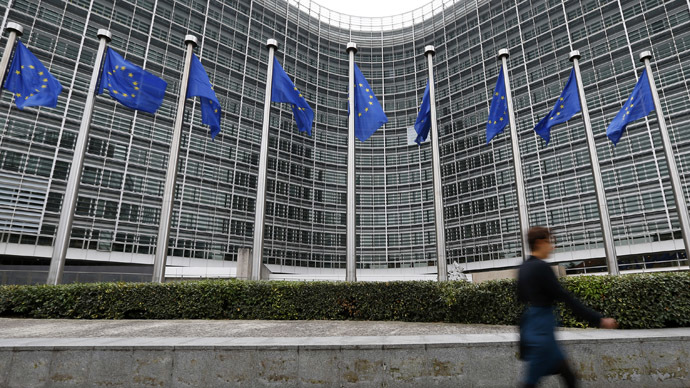‘EU, UK, Australia have jumped on board the US Hollywood-scripted populist narrative’

The European Union is in a kind of box, and new sanctions against Russia just illustrate its policy of “the four Ds”, which is divert, deflect, deceive and deny, financial commentator Mitchell Feierstein told RT.
Today, on September 12, a new package of the EU sanctions against Russia comes into force despite the truce in Ukraine. Brussels decided to halt services that Russia needs to extract oil and gas in the Arctic, deep sea and shale extraction projects. Moreover, five major Russian state-owned banks will be banned from any long-term loans from EU companies, as well as Russia’s three biggest energy companies and the three largest defense entities will be restricted from raising long-term debt on European capital markets. Russian defense companies will be barred from debt refinancing, while export of any technology considered military “dual-use” will be banned for export. Brussels has also added 24 more individuals to the list of those barred from travelling to the EU and having their assets frozen.
RT:New sanctions against Moscow are coming into force. Why do you think the EU decided to go ahead with them? Are you surprised?
Mitchell Feierstein: It is a difficult position, I think the EU is in a kind of box. They have got morose growth throughout the European Union, so I don’t understand this. They are implementing the policy that I call “the four Ds”, which is divert, deflect, deceive and deny. The US came up with a Hollywood-scripted populist narrative that the EU, the UK and Australia have jumped on board. Who actually stands to benefit and who stands to lose from this? We have to look at it: for Rosneft, it stands to lose from it in the oil industry that means they can’t finance certain deals. BP, one of the biggest companies in the world that is held by every pension fund in the West, which is heavily-invested there, that is hurting savers. So basically BP stocks are going down 16 percent from July because of these sanctions, whereas the Russian stock market dropped when the sanctions were originally announced, has popped back up.
RT:Who was against further sanctions?
MF: Seventy-eight percent of German businesses operating in Russia right now said that the sanctions are having no impact. There has been a big consortium of big businesses in Germany that have actually [criticized] Merkel on sanctions – it was Deutsche Bank, Adidas, Siemens and 2-3 others. You also have five countries in Europe that were on defense: Sweden, Finland, Austria, Cyprus and Slovakia, if I’m not mistaken.
RT:Moscow says it's considering responding with a car import ban or maybe by blocking its airspace to European planes. How painful would that be?
MF: It’s a massive problem for those airline companies because most of the airline companies are marginal and their profitability has been down in the past few years because if you have oil prices that have gone up despite what the popular rhetoric is about oil prices and commodity prices coming down. But oil prices are at a cyclical all-time high if you go back. In the past 14 years they have more than doubled. So if an airline has to fly around and it’s marginally making money right now, it is going to put these companies out of business. I don’t think that the EU leadership has carefully thought this out. It is also has to do with the US dollar hegemony and the US dollar as a reserve currency. I think that someone is going eventually to come up and say, “Look, we are going to have an exchangeable currency for a basket of commodities.” You see that trade was done between China and Gazprom for 400 billion, and that’s not dollar denominated. There is a little bit more to the story and NATO’s military spending is going to be buffered, which is going to improve GDP because they are changing the calculation of the GDP in October to include military spending.
The statements, views and opinions expressed in this column are solely those of the author and do not necessarily represent those of RT.
The statements, views and opinions expressed in this column are solely those of the author and do not necessarily represent those of RT.












